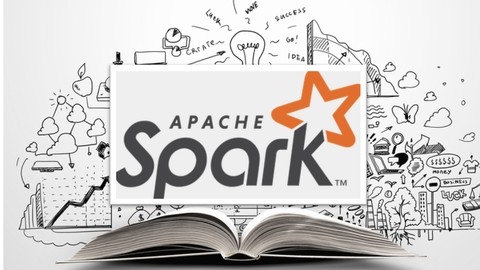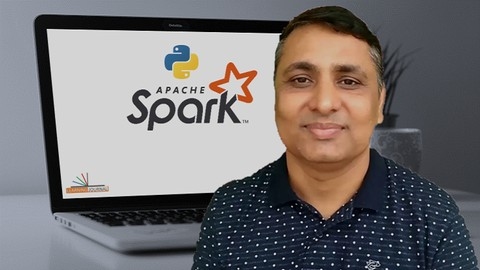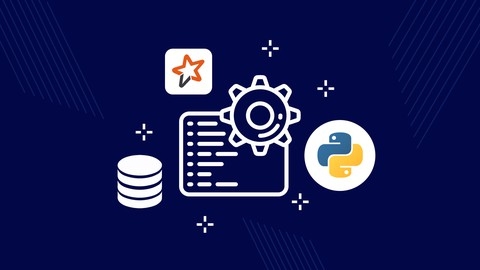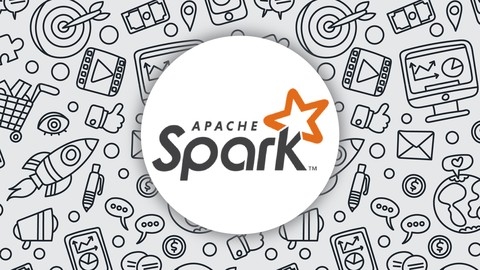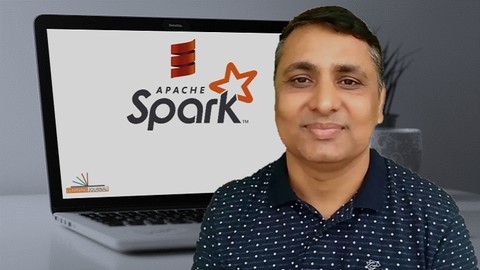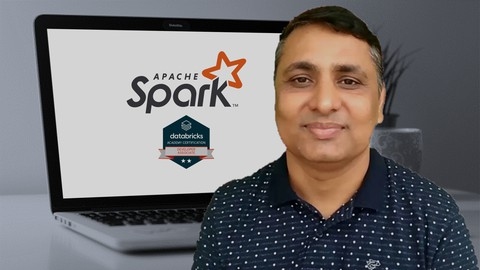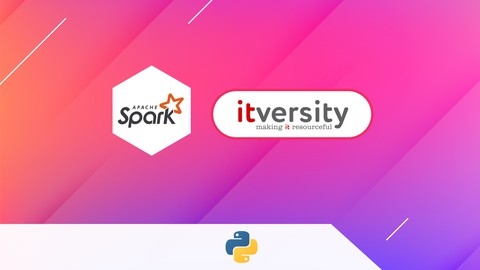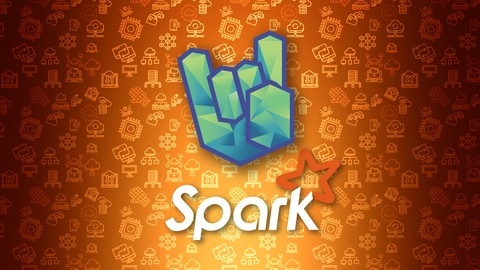Apache Spark with Scala - Hands On with Big Data!
Starting with setting up your development environment, the course ensures you’re ready to dive into Spark and Scala programming.
An optional Scala Crash Course is available for beginners or as a refresher, covering essential programming concepts like syntax and data structures.
The course then progresses to the core of Spark programming, focusing on Resilient Distributed Datasets (RDDs).
Through practical examples, such as analyzing MovieLens data and social network interactions, you’ll learn how to manipulate data using RDDs effectively.
As you advance, you’ll explore SparkSQL, DataFrames, and DataSets for querying structured data efficiently.
Hands-on activities will help you apply these concepts, enhancing your ability to analyze large datasets.
The curriculum also includes advanced topics like machine learning with MLLib, real-time data processing with Spark Streaming, and graph analysis with GraphX.
Each section is packed with exercises and real-world examples, providing valuable practical experience.
Running Spark on a cluster is covered in detail, with instructions on using Amazon’s Elastic MapReduce and troubleshooting Spark jobs.
This knowledge is crucial for deploying Spark applications in real-world scenarios.
By the end of the course, you’ll have a solid foundation in Spark and Scala, equipped with the skills to tackle big data challenges.
Taming Big Data with Apache Spark and Python - Hands On!
Starting with setting up your development environment, the course walks you through installing Python, JDK, Spark, and necessary dependencies on your desktop, preparing you for real-world big data projects.
You’ll quickly dive into analyzing movie ratings with the MovieLens dataset, gaining hands-on experience from the outset.
The course covers the essentials of Spark’s core, the Resilient Distributed Dataset (RDD), teaching you to perform key operations and transformations crucial for big data analysis.
As you progress, you’ll tackle advanced examples, including identifying the most popular movies or superheroes and implementing algorithms like Breadth-First Search.
These activities are designed to sharpen your problem-solving skills in a data-intensive context.
The curriculum also introduces SparkSQL, DataFrames, and DataSets, focusing on efficient handling of structured data and SQL-style queries.
Through practical examples, you’ll learn to analyze social network data and reimplement previous projects using DataFrames, reinforcing your understanding.
For those interested in machine learning, the course explores Spark’s MLLib, where you’ll apply algorithms for movie recommendations and predict real estate prices, offering a solid foundation in machine learning within a big data framework.
Additionally, you’ll learn to run Spark on a cluster using Amazon’s Elastic MapReduce service and Hadoop YARN, including setup, configuration, and troubleshooting, skills vital for large-scale data projects.
The course concludes with an introduction to Spark Streaming, Structured Streaming, and GraphX for real-time data processing and graph computations, rounding out your big data toolkit.
Apache Spark 3 - Spark Programming in Python for Beginners
This course starts with the basics of Big Data and Data Lakes, explaining the significance of Hadoop’s evolution and introducing Apache Spark and Databricks Cloud.
It then guides you through setting up your development environment, whether you’re using Mac or Windows, ensuring you’re ready to write and run Spark code effectively.
The curriculum dives into Spark DataFrames and Spark SQL, teaching you how to manipulate and query data through practical examples.
You’ll gain insights into the Spark Execution Model and Architecture, learning about cluster managers and execution modes to optimize your applications.
The course also covers the Spark Programming Model, focusing on Spark Sessions, project configuration, and unit testing, preparing you for real-world development scenarios.
Advanced topics include working with Spark’s Structured API Foundation, understanding Data Sources and Sinks, and mastering data transformations and aggregations.
This knowledge equips you to handle various data processing tasks with ease.
The capstone project offers a chance to apply your skills in a comprehensive project, including Kafka integration and setting up CI/CD pipelines.
Quizzes and tests throughout the course help reinforce your learning, while bonus lectures and archived content provide additional resources.
By the end of this course, you’ll have a solid understanding of Apache Spark and the skills to tackle data processing challenges confidently.
Data Engineering Essentials using SQL, Python, and PySpark
This course covers essential topics like SQL, Python, Hadoop, and Spark, making it ideal for both beginners and experienced professionals aiming to sharpen their data engineering skills.
You’ll start with SQL for Data Engineering, learning about database technologies, data warehouses, and advancing from basic to complex SQL queries.
The course then guides you through Python programming, from setting up your environment to mastering data processing with Pandas Dataframe APIs.
A significant focus of this course is on Apache Spark.
You’ll learn to set up a Databricks environment on the Google Cloud Platform (GCP), gaining hands-on experience in data processing with Spark SQL and PySpark.
This includes creating Delta tables, performing data transformations, aggregations, joins, and optimizing Spark applications for better performance.
Real-world projects like a File Format Converter and a Files to Database Loader offer practical experience, while sections on ELT data pipelines using Databricks provide insights into efficient data pipeline construction and operation.
Performance tuning is thoroughly covered, teaching you to read explain plans, identify bottlenecks, and apply optimization strategies.
Additionally, the course equips you with troubleshooting and debugging skills for SQL, Python, and Spark applications, preparing you to solve common development and deployment issues.
Apache Spark 2.0 with Java -Learn Spark from a Big Data Guru
Starting with an introduction to Spark and the essential setup of Java and Git, this course prepares you for the practical world of big data processing.
You’ll quickly move on to executing your first Spark job, with guidance for Windows users on running Hadoop smoothly.
The course thoroughly covers RDD (Resilient Distributed Datasets), teaching you to create, transform, and manage RDDs with real-world problem-solving exercises.
It also demystifies Spark’s architecture and components, providing a clear understanding of its operational backbone.
Pair RDDs and their operations, including key aggregation and join operations, are explained in detail, equipping you with the skills to manipulate complex datasets.
The advanced sections on accumulators and broadcast variables offer strategies for optimizing Spark applications.
A significant focus is on Spark SQL, where you’ll learn data processing techniques, performance tuning, and the nuances of dataset and RDD conversions.
The course concludes with lessons on deploying Spark applications in a cluster, specifically using Amazon EMR, preparing you for scalable big data projects.
With additional resources on how major companies leverage Apache Spark and common pitfalls to avoid, this course ensures you’re well-prepared for real-world challenges.
Apache Spark for Java Developers
Starting with an introduction to Spark’s architecture and the basics of Resilient Distributed Datasets (RDDs), it lays a solid foundation for understanding distributed data processing.
The course guides you through setting up your environment, highlighting the compatibility of Java versions with Spark to avoid common pitfalls.
You’ll gain hands-on experience with core Spark operations such as mapping, reducing, and outputting results, essential for manipulating and analyzing big datasets.
The curriculum includes practical exercises like the keyword ranking project, offering real-world application of the concepts learned.
For those looking to deploy applications, the course covers deploying to AWS EMR, providing insights into running Spark jobs in a cloud environment.
It also dives into SparkSQL and DataFrames, enabling you to perform SQL queries and data manipulations seamlessly within Spark.
A dedicated module on SparkML introduces you to machine learning in Spark, covering linear regression, decision trees, and building recommender systems.
This is invaluable for applying machine learning algorithms to big data.
The course concludes with a focus on Spark Streaming and structured streaming with Kafka, equipping you with the skills to process real-time data streams.
This is crucial for making timely data-driven decisions in today’s fast-paced environment.
Apache Spark 3 - Spark Programming in Scala for Beginners
The course begins with an introduction to Big Data, Data Lakes, and Hadoop’s evolution, setting a strong foundation for understanding the significance of Apache Spark in processing large datasets efficiently.
The course guides you through setting up Spark in various environments, including command line, IntelliJ IDEA, and Databricks, preparing you for real-world scenarios.
You’ll learn about Spark’s execution model and architecture, gaining insights into distributed processing, execution modes, and how to optimize your Spark applications.
Key sections include in-depth exploration of the Spark Programming Model, where you’ll work with Spark Sessions, DataFrames, and understand debugging and unit testing.
This builds your capability to manipulate and analyze data effectively.
Advanced topics covered are RDDs, Datasets, DataFrames, and using Spark SQL for data analysis.
You’ll become proficient in reading and writing data in formats like CSV, JSON, and Parquet, and managing Spark SQL tables.
The course also dives into DataFrame and Dataset Transformations, Aggregations, and Joins, equipping you with the skills to perform complex data analysis and optimizations.
Quizzes throughout the course test your understanding, complemented by provided source code and resources for additional support.
Apache Spark 3 - Beyond Basics and Cracking Job Interviews
Starting with an introduction to Spark’s architecture, you quickly move to practical insights on Spark Cluster Runtime Architecture and job submission techniques, including Spark Submit and Deploy Modes.
This foundational knowledge prepares you for advanced topics.
You’ll explore Spark Jobs, focusing on stages, shuffle, tasks, and slots, and dive into Spark SQL Engine and Query Planning.
The course ensures you grasp these concepts through quizzes and solution videos, reinforcing your learning.
The performance and applied understanding section is where you tackle Spark Memory Allocation, Management, and Adaptive Query Execution, including Dynamic Join Optimization.
Lessons on handling Data Skew, Data Caching, and Dynamic Partition Pruning offer strategies for optimizing data processing.
You’ll also learn about Repartition, Coalesce, Dataframe Hints, Broadcast Variables, and Accumulators to boost performance.
Further, the course covers Speculative Execution, Dynamic Resource Allocation, Spark Schedulers, and Unit Testing in Spark, preparing you to build efficient and error-free applications.
Master Apache Spark using Spark SQL and PySpark 3
Starting with an introduction to the basics on Udemy, this course guides you through setting up your development environment, using ITVersity Labs for hands-on practice, and mastering Python fundamentals critical for Spark.
You’ll gain practical experience with Hadoop HDFS commands, essential for the CCA 175 Certification exam, and explore the core features of Apache Spark 2.x.
The course meticulously covers Spark SQL, teaching you to run queries, manage databases, and perform basic transformations such as filtering, joining, and aggregating data.
Beyond structured data, you’ll learn to process semi-structured data like JSON, working with ARRAY, MAP, and STRUCT types.
This prepares you to handle a variety of data formats with ease.
The curriculum also focuses on the Apache Spark application development lifecycle, from installation to productionizing your code.
You’ll explore deployment modes, learn how to pass application properties files, and manage external dependencies, equipping you with the skills to develop and deploy Spark applications confidently.
Apache Spark 3 & Big Data Essentials in Scala | Rock the JVM
Starting with a Scala recap, it quickly moves to Spark’s core principles, ensuring you’re well-prepared even if Scala is new to you.
The course dives deep into the Spark Structured API, focusing on DataFrames.
You’ll learn the basics, how DataFrames operate, and how to manipulate data sources with practical exercises for real-world application.
It also covers DataFrame operations like aggregations and joins, enhancing your data handling skills.
Beyond DataFrames, the course explores Spark types and datasets, teaching you to manage both simple and complex data types and null values.
It emphasizes type-safe data processing with datasets, supported by hands-on exercises to solidify your learning.
Spark SQL is another critical area this course covers, showing you how to use Spark as a database and execute SQL queries, with exercises to practice your new skills.
The inclusion of low-level Spark concepts, focusing on RDDs, ensures you have a comprehensive understanding of Apache Spark.
By the end of this course, you’ll not only grasp Apache Spark and Big Data essentials but also gain practical experience, making you proficient in using Apache Spark with Scala.
